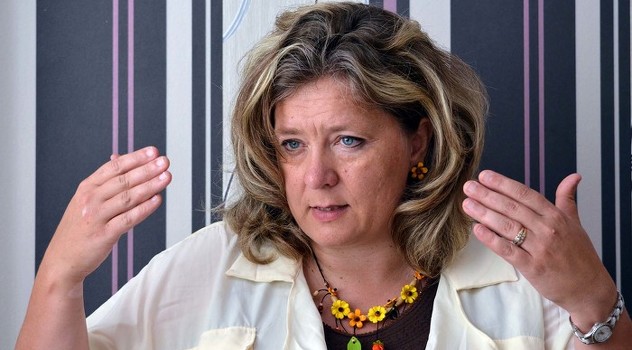CAMA Kosovo worker Lisa Ramsey was invited to provide training for Red Cross volunteers responding to the severe flooding in Bosnia. Below is a translation of an interview she gave to the Bosnian news agency FENA regarding the training seminars.
American Psychologist: People in Bosnia and Herzegovina are strong, but the floods brought great pain.
July 9, 2014
American psychologist Lisa Ramsey arrived in Sarajevo to help volunteers who work in areas affected by the recent floods. Talking to FENA, Ramsey said she wants to help volunteers prepare to be able to work longer periods without becoming burned out as they provide assistance in very stressful situations.
“Also, I want to teach people how to cope with their emotions when they are under stress, how to control them, as well as some relaxation techniques,” said Ramsey.
This effort will, she says, show volunteers how to help themselves first so that they can go on to help people who are struggling, “because this is a big loss, with much trauma and grief.”
That’s what the purpose was of yesterday’s lecture in Sarajevo.
“I’ll hold another lecture to help those who are suffering, that is, survivors. Psychologists call them ‘survivors’ rather than ‘victims’ because they have actually survived so much. We need to find ways to stabilize their mental state,” explains Ramsey.
That’s why, she said, she wants to help people who volunteer provide critical information regarding survivors’ basic needs.
“Information is important because we can make great progress if people give the right information, such as where and how can I get food,” said Ramsey.
She further clarifies that providing aid in the first days after a disaster involves stabilizing people, helping to make decisions, offering compassion, and avoiding any condemnation so that people can feel safe and begin to rebuild their lives.
“One of the things which I will also talk about is how to assess who might be contemplating suicide, as people resolve to commit suicide when left with no hope. For many people what happened was something that could deprive them of their last hope,” warned Ramsey.
She added that the assessment of people who contemplate suicide, and the hope of another way out, will show survivors that they are loved and cared for by volunteers and the community, and that it will encourage them and help them survive this loss.
“People in Bosnia and Herzegovina are strong and resilient, and work at this resilience. But at some point we all come to our end,” says Ramsey.
Asked about how to help particularly vulnerable groups, such as young mothers with children, Ramsey said it was initially most important to provide them with food and show them that the community will help them.
“It is important to let them know that they are not alone. I’m glad to hear that the community cares about the people and brings them food. I think it is important that people know they can count on others in tough times,” explained Ramsey.
It’s also important, she added, to explain to people that they are not victims and that they can rebuild their lives “because we cannot change the past, but we can influence the future, and we have the present moment.”
“You need to give people time to mourn, but when they are ready for the next step then you need to discuss with them how to seize the present moment. My task as a psychologist is to provide security, answer questions, and give ideas on how to connect with other people and come up with some solutions,” concluded psychologist Ramsey in an interview with FENA News Agency.
Lisa Ramsey is a psychologist and counselor whose specialty is working with people who have undergone trauma. She has many years of experience working in the Balkans. For the past seven years she has worked in Kosovo as part of an American organization for relief and development called “Compassion and Mercy Associates” (CAMA). Prior to that, she had a private practice in Oregon (USA).
The original article is posted at http://www.klix.ba/vijesti/bih/americka-psihologinja-ljudi-u-bih-su-jaki-ali-su-poplave-donijele-veliku-bol/140709054.
